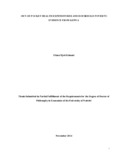| dc.description.abstract | Background: Out-of-pocket health expenditures leave households exposed to the risk of
financial catastrophe and poverty, whenever they entail significant dissaving, borrowing or
the sale of key household assets. However, by enabling households to consume essential
medical care in the event of a major illness or injury out-of-pocket outlays help households to
restore health, and can thus increase their future labour productivity. Therefore, the effect of
catastrophic health expenditure on household welfare is an empirical matter on which little
evidence currently exists in Kenya.
Methods: Using Kenya Household Health Expenditures and Utilization Survey (KHHEUS)
data of 2007 (n = 8414), the thesis investigates impacts of out-of-pocket expenditures on
health and on other dimensions of wellbeing. In particular we estimate a negative binomial
model to examine the impact of out-of-pocket expenditures on health care utilization, a logit
model to analyze determinants of catastrophic health expenditures, and a Two Stage Residual
Inclusion (2SRI) model to measure effects of catastrophic expenditure on household poverty.
In all cases, the common estimation problems of endogeneity, heterogeneity,
multicollinearity and heteroskedasticity are addressed. Sensitivity analysis is used to check
the robustness of the estimates.Findings: Descriptive statistics indicate that 17 percent of those who reported illness did not
seek health care, with more than 50 percent quoting lack of money as the main hindrance.
Among those who utilized health care, 12 percent experienced catastrophic expenditures, and
4 percent (2.5 million individuals) were impoverished or made poorer by these payments.
The poor experienced the highest incidence of catastrophic expenditures. The econometric
analysis reveals that out-of-pocket expenditures are a deterrent to health service utilization,
are significantly and positively associated with catastrophic expenditure and with household
poverty. It is further shown that catastrophic expenditures impoverish households through
their large negative effects on health and wealth. Catastrophic expenditures exclude lowincome
households from health care, and conditional on them getting care, they get it in
insufficient quantity, and are forced into indebtedness or sale of assets to pay for it.
Furthermore, even when catastrophic health expenditure enables the household to improvethe health of its members, labour market failures often prevent realization of potential gains
from health investments. The findings of the thesis strongly point to a need to explore
mechanisms for cushioning households against catastrophic out-of-pocket expenditures. | en_US |

